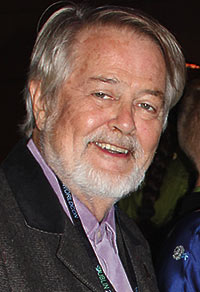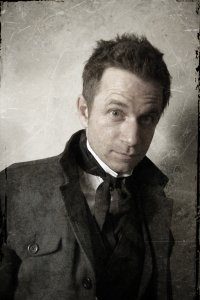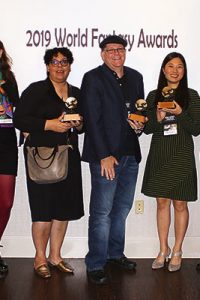Rivers Solomon: Into the Deep

Rivers Solomon was born in 1989 and grew up in California, Indiana, Texas, and New York. They attended Stanford University, graduating with a degree in Comparative Studies in Race and Ethnicity, and earned a MFA at the Michener Center for Writers at the University of Texas at Austin.
Debut novel An Unkindness of Ghosts was a finalist for Gaylactic Spectrum and Lambda Awards, and was selected for the James Tiptree, Jr. Memorial Award honor list. Second novel The Deep (2019) is an expansion of the Hugo Award-nominated song “The Deep” (2017) by clipping. Their short fiction includes “Blood Is Another Word for Hunger” (2019) at Tor.com and “St. Juju” (2019) at The Verge. Solomon was twice nominated for the John W. Campbell Award for Best New Writer, in 2018 and 2019.
Solomon lives in Cambridge, England with their family.
Excerpts from the interview:
“I’ve always been a big reader. Literacy was pushed by my family, and by my mother in particular. I’ve always been a perfectionist, so all my intellectual energy went into doing schoolwork and being the perfect student. In third grade I moved from Indiana to Texas, and my new school had a program where each book had points assigned to it, and the bigger the book was, the more points it was worth. You would read the book and take a quiz at the end, and if you passed the quiz you got the points, and if you got a certain amount of points, you got a reward. The rewards weren’t even literacy related – they were like, you got to go to a fast food restaurant for lunch or something. I’m really appreciative of the program, because it got me back into reading books after having put them aside for most of my early childhood. I read probably every book in my elementary school’s library – that’s an exaggeration, but only just. It certainly felt that way. This was slightly before the children’s fiction revival, so there wasn’t much middle grade and YA at the time. It was mostly still classics, like The Secret Garden and Little Women and Charlotte’s Web. Harry Potter came to the US when I was in fourth grade, and that was the first thing that was like, ‘Oh, this is a contemporary children’s book.’ The big books I remember at my school were Beverly Cleary books and Henry and the Paper Route and stuff like that. I read through all of those, and when I exhausted the children’s library, it was like, ‘Okay, what’s next? Stephen King, I guess?’ That was the trajectory. So for most of middle school I read horror – I’m still a big horror fan. I was reading a lot of science fiction and fantasy at the time, too. Once I read all the children’s books, adult science fiction and fantasy seemed like the next thing, for whatever reason.
“The Secret Garden was one of the most formative books for me. I just reread it recently, and I love that book because Mary Lennox, the protagonist, is so ornery and unlikeable, and it’s beautiful to see a character like that. It was meaningful to me as a kid who felt a little bit different. There’s something pleasing about a girl who was so unapologetically unfriendly. I loved it then, and I loved it when I reread it. Little Women was another one of those books I read for the points, but it had a huge emotional impact. I read a lot of survivalist books, like Hatchet, My Side of the Mountain, even the first Boxcar Children book, where they’re trying to make their way in their boxcar. That’s been hugely influential for me. I’ve drawn on a lot of those works for my third book, which I’ve just finished. In high school, a lot of my reading was just books for school. We had a robust English program, and we were reading books pretty quickly. I got away from reading for myself a bit, because I saw reading as something you do as an assignment. It’s so funny, because I’ll go back and reread these books and think, ‘Oh damn, this was really good.’ I definitely did not appreciate it at all at the time, which is such a shame. I’m not saying that we shouldn’t assign books in school, obviously, but there has to be a better way, because it’s amazing how I’ll go back to read a book, and think, ‘Damn! The language is beautiful, the story is compelling, I’m flying through this. This is not how I remember the experience when I was reading it at 15.’
“Horror gets at the extremes of human existence, and at the heart of a lot of our philosophical questions, like who we are in the most challenging conditions. Horror has that intensity of emotion, and I’m most likely to find a horror book un-put-downable, because it draws in all my senses and all my fears. As a reader, you’re afraid for the character, and there’s almost always some kind of suspense element. I love it, but even people who don’t like horror tend to be drawn to it – repulsed and drawn in at the same time. There’s an inherent entertainment quality to horror, but there’s also a philosophical angle – who are we at the worst possible moments in our lives? Can we survive our most terrible moments? That’s compelling.
“I also like things that are adjacent to horror, like some thrillers. I’ve recently read these two books by Laura Purcell. One is called The Corset. It takes place in the late 19th century, and it’s about this young girl who’s on trial for murder. She has this power to put whatever she’s feeling into anything she sews or weaves. It’s a traditional fabulist situation, and it’s such a dark book, full of all these really bitter human emotions. Obviously I can’t relate that strongly to what it would have been like to be a 14-year-old seamstress in 19th-century England, but there’s something about the hate she experiences that resonates. She’s quite a marginalized person, an apprentice, but it’s essentially an indentured servant situation. There’s all this pain, and huge power differentials, so despite it not being a situation I’ve been through, it draws me in and is extraordinarily relatable – all those human feelings of bitterness and anger, feeling jilted and not being the one in power, and how terrifying that is – it’s so good. People tend to call it ‘historical thriller.’
“Even when I wasn’t reading, I was always a writer. From preschool or kindergarten I was writing little stories and illustrating them. I learned to type, which I thought was amazing. We had a word processor, so I was always writing stories, and they were always fantastical to some degree. There was this one story where this boy put too much detergent in the washing machine and the bubbles took over the whole town. But not just that – the bubbles took over the whole town, and then I had this idea that, ‘Oh, washing clothes makes them shrink,’ so everybody in the town shrunk as well. Then the boy had to figure out how to unshrink everybody. There were stories like that.
“By high school I was writing more mature stories, and I told my English teacher before I graduated that I wanted to be an important writer and win awards. But I was saying, ‘Oh, I’m going to be a writer,’ the same way you say, ‘Oh, I’m going to be an actress,’ or, ‘Oh, I’m going to be a ballerina,’ when you’re ten. The undergraduate program I went to had a strong creative writing program, though – Stanford University hosts a big fellowship called the Stegner Fellowship, so lots of creative writers come in and out of the school. I could see writing was something people actually did, and that I could make a living out of writing; there’s a way to carve out a professional life as a writer. It wasn’t just this fantasy career. It’s something you can work toward and actually do. Writing was not my focus academically, though I did take a lot of creative writing courses as I bounced around from thing to thing. My major ended up being called Comparative Studies in Race and Ethnicity. My first few years were basically taking as many creative writing classes as I could and as many language classes as I could. The reason I didn’t pursue an English major with a creative writing focus is that I was really turned off by all the required reading for the English part of the major. I don’t want to read Victorian novels and the whole canon of novels that don’t interest me right now. As I get older, that’s more and more true – I’m not interested in putting time and energy into things that are not personally meaningful to me. I just can’t do it. First of all, I’m not good at doing it – it’s setting myself up for failure if I try – but also, philosophically, we only have so much time. Even by age 20, even if it was just one semester, I would rather be doing something I enjoy for that semester. I was still taking literature courses in my major, but they were in the types of literature I found more interesting, and I was reading contemporary writers of color, which just felt more personally meaningful.
“There was one moment I can trace things back to, when I was in a creative writing class. My professor, Adam Johnson, was a brilliant and interesting person and he taught lots of creative writing courses, and he really got my weird stuff. I had written this story I was disappointed with, and it felt like the end. One day I asked him, ‘Do you think it’s possible to get better?’ In so much of the school system, you feel like you’ve got the talent or you don’t have the talent – you’ve got the juice or you don’t. I said, ‘Is this it? Can I get better?’ He just said, ‘Absolutely.’ It’s a boring exchange, in retrospect, but it made me say, ‘I can do this. If it is possible for me to get better, then I can do this professionally, because I have the drive and the interest, and writing is one of the only things that I love and can lose myself in completely.’ This was in late junior year in college, and I was at the point of thinking about what comes after college – the dreaded question. I started looking into MFA programs. I knew that financially I wouldn’t be able to do a program that wasn’t fully funded, so that limits you to about 25 programs. I spent the rest of my junior year and that summer just writing as much as possible, trying to write complete stories. I don’t think I was even getting much feedback. It was enough to write a story, an actual complete story from start to finish, and then move on to the next one. I was improving rapidly as I went into senior year and decided I was going to apply to programs. I went to the creative writing teachers I had and asked, ‘Is this a strong writing sample?’ I got feedback about what to submit, and that’s that.”
Interview design by Stephen H. Segal. Photo by Arley Sorg.
Read the full interview in the December 2019 issue of Locus.
 While you are here, please take a moment to support Locus with a one-time or recurring donation. We rely on reader donations to keep the magazine and site going, and would like to keep the site paywall free, but WE NEED YOUR FINANCIAL SUPPORT to continue quality coverage of the science fiction and fantasy field.
While you are here, please take a moment to support Locus with a one-time or recurring donation. We rely on reader donations to keep the magazine and site going, and would like to keep the site paywall free, but WE NEED YOUR FINANCIAL SUPPORT to continue quality coverage of the science fiction and fantasy field.







